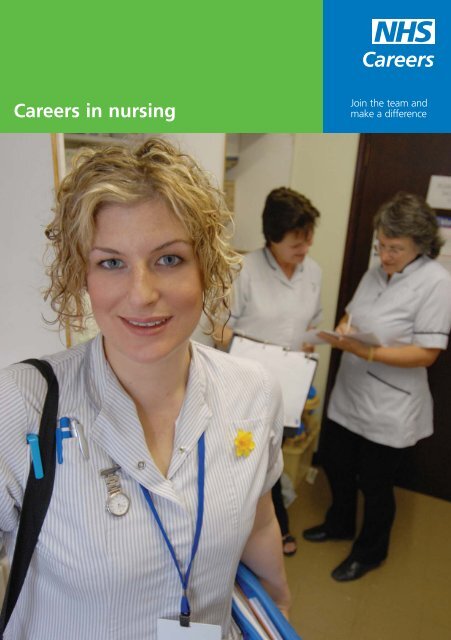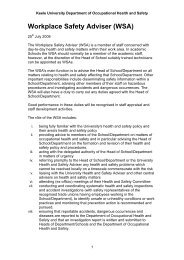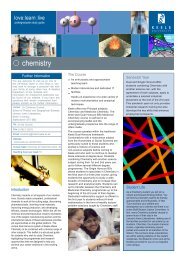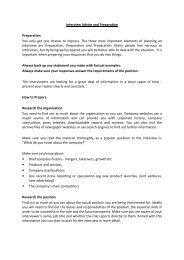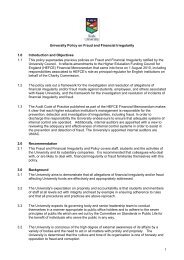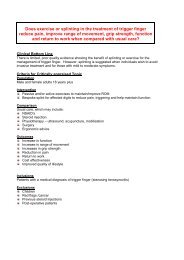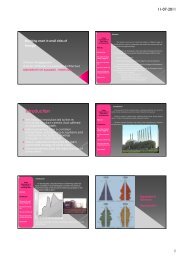Careers in nursing - Keele University
Careers in nursing - Keele University
Careers in nursing - Keele University
You also want an ePaper? Increase the reach of your titles
YUMPU automatically turns print PDFs into web optimized ePapers that Google loves.
<strong>Careers</strong> <strong>in</strong> nurs<strong>in</strong>g<br />
Jo<strong>in</strong> the team and<br />
make a difference
Welcome to the NHS<br />
The NHS offers a huge range of excit<strong>in</strong>g and challeng<strong>in</strong>g opportunities for people who<br />
are passionate about mak<strong>in</strong>g a difference.<br />
With more than 300 different careers on offer, there is a job for you no matter what<br />
your skills, <strong>in</strong>terests or qualifications.<br />
What’s more, you’ll be given every opportunity to build on your skills and learn new<br />
ones as part of the Career Framework – a system that demonstrates our commitment<br />
to skills development. See pages 10 and 11 for more <strong>in</strong>formation about this.<br />
Scientists, accountants, porters, psychologists, nurses, <strong>in</strong>formation technologists and<br />
estate managers, to name but a few, are all needed to ensure the smooth runn<strong>in</strong>g of<br />
the NHS. These people, and many more, work together as a team to deliver the very<br />
best care for our patients.<br />
To f<strong>in</strong>d out more about becom<strong>in</strong>g a member of the NHS team, call 0845 60 60 655,<br />
email advice@nhscareers.nhs.uk or visit www.nhscareers.nhs.uk<br />
We look forward to hear<strong>in</strong>g from you!<br />
Contents<br />
2 The NHS – a reward<strong>in</strong>g place to work<br />
Benefits<br />
Pay and conditions<br />
Work-life balance<br />
6 Your career as a nurse<br />
10 Career Framework<br />
Develop<strong>in</strong>g your career <strong>in</strong> the NHS<br />
12 What opportunities are available?<br />
Adult nurs<strong>in</strong>g<br />
Mental health nurs<strong>in</strong>g<br />
Children’s nurs<strong>in</strong>g<br />
Learn<strong>in</strong>g disabilities nurs<strong>in</strong>g<br />
District nurs<strong>in</strong>g<br />
Neonatal nurs<strong>in</strong>g<br />
Health visitors<br />
Practice nurs<strong>in</strong>g<br />
Prison nurs<strong>in</strong>g<br />
School nurs<strong>in</strong>g<br />
19 Gett<strong>in</strong>g started<br />
23 What’s your next step?
Foreword<br />
If you want to work <strong>in</strong> an environment that’s<br />
<strong>in</strong>terest<strong>in</strong>g, reward<strong>in</strong>g and challeng<strong>in</strong>g, a career <strong>in</strong><br />
nurs<strong>in</strong>g will give you plenty of scope to do exactly that.<br />
Nurses form the largest group of staff <strong>in</strong> the NHS<br />
and are a crucial part of the healthcare team. Nurses<br />
work <strong>in</strong> every sort of health sett<strong>in</strong>g from accident<br />
and emergency to work<strong>in</strong>g <strong>in</strong> patients’ homes, with<br />
people of all ages and backgrounds. So, if you’ve got<br />
an <strong>in</strong>terest <strong>in</strong> car<strong>in</strong>g for people, you’ll f<strong>in</strong>d a role that<br />
suits you <strong>in</strong> nurs<strong>in</strong>g.<br />
Some nurses beg<strong>in</strong> their career by work<strong>in</strong>g their way<br />
up from support roles, which require no set<br />
qualifications, and go on to tra<strong>in</strong> for a registered<br />
nurs<strong>in</strong>g degree or diploma, which qualifies them to<br />
work as a nurse. Others apply straight to university to<br />
undertake their studies. Whatever route you take,<br />
you’ll need to ga<strong>in</strong> a degree or diploma <strong>in</strong> nurs<strong>in</strong>g,<br />
dur<strong>in</strong>g which the NHS will support you. For <strong>in</strong>stance,<br />
your tuition fees will usually be paid and you may be<br />
eligible for a bursary.<br />
Once you are part of the NHS, you’ll benefit from<br />
flexible work<strong>in</strong>g arrangements, excellent benefits and<br />
a wealth of opportunities to help you fulfil your<br />
ambitions and progress up the career ladder. There<br />
are few professions that offer so much <strong>in</strong> terms of job<br />
satisfaction and support, while giv<strong>in</strong>g you the chance<br />
to enhance people’s lives dur<strong>in</strong>g their times of need.<br />
The NHS <strong>Careers</strong> team<br />
For more <strong>in</strong>formation about work<strong>in</strong>g <strong>in</strong><br />
nurs<strong>in</strong>g, please visit<br />
www.nhscareers.nhs.uk/list/work<strong>in</strong>g<br />
If you have any questions, call our<br />
helpl<strong>in</strong>e on 0845 60 60 655 or email<br />
advice@nhscareers.nhs.uk
2<br />
<strong>Careers</strong> <strong>in</strong> nurs<strong>in</strong>g<br />
The NHS – a reward<strong>in</strong>g place to work<br />
There are very few careers as reward<strong>in</strong>g as one <strong>in</strong> the NHS, or that give you the opportunity to<br />
work with such a wide variety of people.<br />
We actively recruit people of all ages, backgrounds<br />
and levels of experience. This helps us understand<br />
the different needs of the patients we serve every<br />
day and provide the best possible service.<br />
Whichever area you jo<strong>in</strong>, you become part of a<br />
talented, passionate team of people – committed to<br />
provid<strong>in</strong>g the best care and treatment to patients.<br />
You will also enjoy one of the most competitive and<br />
flexible benefits packages offered by any employer <strong>in</strong><br />
the UK.<br />
Benefits of work<strong>in</strong>g <strong>in</strong> the NHS<br />
Everyone who jo<strong>in</strong>s the NHS is guaranteed a salary<br />
that matches their ability and responsibilities, and<br />
given every opportunity to <strong>in</strong>crease it through<br />
tra<strong>in</strong><strong>in</strong>g and development.<br />
You will receive at least 27 days’ holiday each year,<br />
plus a range of other benefits, <strong>in</strong>clud<strong>in</strong>g occupational<br />
health and counsell<strong>in</strong>g services.<br />
Jo<strong>in</strong> one of the UK’s best pension schemes<br />
The NHS Pension Scheme is one of the most<br />
generous and comprehensive <strong>in</strong> the UK. Every new<br />
employee automatically becomes a member and you<br />
will get an excellent package of pension benefits,<br />
fully protected aga<strong>in</strong>st <strong>in</strong>flation and guaranteed by<br />
the government.A new national pay system –<br />
Agenda for Change – was <strong>in</strong>troduced across the<br />
For more <strong>in</strong>formation about the pension, and<br />
a full list of the benefits <strong>in</strong>cluded, please visit<br />
www.nhscareers.nhs.uk/list/payandbenefits<br />
PAY AND CONDITIONS<br />
The NHS pay system, known as Agenda for<br />
Change, offers real benefits for all directly<br />
employed staff except doctors, dentists and very<br />
senior managers, <strong>in</strong>clud<strong>in</strong>g:<br />
• a standard work<strong>in</strong>g week of 37.5 hours<br />
• holiday entitlement of 27 days a year, plus eight<br />
general and public holidays, ris<strong>in</strong>g to 33 days<br />
after 10 years of service<br />
• new pay enhancements to reward out of hours,<br />
shift and overtime work<strong>in</strong>g<br />
• better career and pay progression based on the<br />
application of knowledge and skills<br />
• annual personal development reviews to<br />
support career aspirations.<br />
Other benefits of work<strong>in</strong>g <strong>in</strong> the NHS <strong>in</strong>clude<br />
tra<strong>in</strong><strong>in</strong>g, occupational health services, automatic<br />
membership of the NHS Pension Scheme (unless<br />
you choose to opt out) and study leave for<br />
sponsored courses.<br />
To f<strong>in</strong>d out more about the different Agenda<br />
for Change pay bands and to see the most<br />
up-to-date start<strong>in</strong>g salaries for each one, visit<br />
www.nhscareers.nhs.uk/list/payandbenefits<br />
You can also order a copy of this year’s pay<br />
leaflet by call<strong>in</strong>g our helpl<strong>in</strong>e on<br />
0845 60 60 655, or email<strong>in</strong>g<br />
advice@nhscareers.nhs.uk
telephone 0845 60 60 655 email advice@nhscareers.nhs.uk <strong>Careers</strong> <strong>in</strong> nurs<strong>in</strong>g 3<br />
FULFIL YOUR POTENTIAL<br />
• The NHS is committed to offer<strong>in</strong>g<br />
development and learn<strong>in</strong>g opportunities for<br />
all full-time and part-time staff<br />
• No matter where you start with<strong>in</strong> the NHS,<br />
you’ll have access to extra tra<strong>in</strong><strong>in</strong>g and be<br />
given every chance to progress with<strong>in</strong> the<br />
organisation<br />
• You will receive an annual personal review<br />
and development plan to support your<br />
career progression<br />
• You will be encouraged to extend your range<br />
of skills and knowledge and take on new<br />
responsibilities through the Knowledge and<br />
Skills Framework.<br />
See pages 10 and 11 for more on the<br />
Career Framework and examples of how<br />
other employees have progressed through<br />
the NHS.
4<br />
<strong>Careers</strong> <strong>in</strong> nurs<strong>in</strong>g<br />
CASE STUDY<br />
Name: Stuart Kerr<br />
Job title: staff nurse, Royal United Hospital, Bath<br />
Entry route: access course followed by diploma<br />
Stuart had planned to jo<strong>in</strong> the Royal Navy,<br />
but <strong>in</strong>stead decided to do a diploma <strong>in</strong><br />
adult nurs<strong>in</strong>g to ga<strong>in</strong> entry to university.<br />
He is currently study<strong>in</strong>g for a degree <strong>in</strong><br />
critical care.<br />
There is noth<strong>in</strong>g quite like hav<strong>in</strong>g a close-knit team,<br />
such as the one I’m <strong>in</strong> at the m<strong>in</strong>ute. You have to<br />
be a good communicator to work well <strong>in</strong> teams<br />
but you also have to be able to work on your<br />
own. So, you have to have a bit of <strong>in</strong>itiative and<br />
get on and do stuff, and when you’re stuck<br />
you can't be afraid to ask questions.<br />
I’m really happy where I am at the moment –<br />
I’m do<strong>in</strong>g my critical care degree, specialis<strong>in</strong>g<br />
<strong>in</strong> coronary care. I would like to work on the<br />
<strong>in</strong>tensive therapy unit for a while and<br />
eventually move up the career ladder and<br />
become a senior nurse, and maybe one day<br />
become an NHS ward manager – but that’s a<br />
long way down the l<strong>in</strong>e. One of the<br />
advantages of be<strong>in</strong>g a nurse is there are so<br />
many opportunities and career pathways.<br />
To do my job, you have to be someone who<br />
loves learn<strong>in</strong>g because it is a life-long process<br />
when you are a nurse. While I’m still learn<strong>in</strong>g,<br />
I’m happy. I feel that nurses make a difference<br />
every day; it could be assist<strong>in</strong>g with the<br />
resuscitation of a patient, assist<strong>in</strong>g the<br />
medical staff at 3am or just listen<strong>in</strong>g to a<br />
person talk about their feel<strong>in</strong>gs regard<strong>in</strong>g<br />
their diagnosis.<br />
Nurs<strong>in</strong>g is hard work, however noth<strong>in</strong>g gives<br />
you a better feel<strong>in</strong>g than be<strong>in</strong>g able to see a<br />
person, who on admission was seriously ill,<br />
leave hospital a lot healthier and go home.<br />
One of the advantages of<br />
be<strong>in</strong>g a nurse is there are so<br />
many opportunities and<br />
career pathways
telephone 0845 60 60 655 email advice@nhscareers.nhs.uk <strong>Careers</strong> <strong>in</strong> nurs<strong>in</strong>g 5<br />
Help<strong>in</strong>g you f<strong>in</strong>d the right work-life balance<br />
As an NHS employee, you can benefit from flexible<br />
work<strong>in</strong>g, childcare, and high standards for equality<br />
and diversity thanks to the Improv<strong>in</strong>g Work<strong>in</strong>g Lives<br />
(IWL) <strong>in</strong>itiative.<br />
S<strong>in</strong>ce its <strong>in</strong>troduction <strong>in</strong> 2000, the programme has<br />
helped br<strong>in</strong>g about a real culture change with<strong>in</strong> the<br />
NHS – reduc<strong>in</strong>g stress, <strong>in</strong>creas<strong>in</strong>g motivation and<br />
improv<strong>in</strong>g productivity among staff. All these factors<br />
have led to higher levels of patient care.<br />
You can f<strong>in</strong>d more <strong>in</strong>formation about the<br />
<strong>in</strong>itiative and the plans for the future at<br />
www.nhsemployers.org/excellence<br />
As well as advice and support for people look<strong>in</strong>g<br />
after sick or elderly relatives, we provide a range of<br />
childcare services for all NHS employees, <strong>in</strong>clud<strong>in</strong>g:<br />
• nursery care<br />
• after-school and breakfast clubs<br />
• holiday play schemes<br />
• emergency care.<br />
Get more <strong>in</strong>formation about the benefits<br />
and opportunities offered by the NHS at<br />
www.nhscareers.nhs.uk/list/payandbenefits<br />
Manage your commitments <strong>in</strong> and out of work<br />
The size and diversity of the NHS means we can offer<br />
you a range of flexible work<strong>in</strong>g opportunities.<br />
Part-time roles and jobshare opportunities are often<br />
available, as well as term-time only, even<strong>in</strong>g and<br />
weekend positions. We will do everyth<strong>in</strong>g we can to<br />
help you comb<strong>in</strong>e your work for us with<br />
commitments <strong>in</strong> your life outside work – whether<br />
you’re study<strong>in</strong>g for a new qualification, rais<strong>in</strong>g a<br />
family or juggl<strong>in</strong>g other responsibilities.<br />
Many people <strong>in</strong> the NHS take an extended break to<br />
look after young children or other dependents who<br />
need special care, or to study full time.<br />
We will help you comb<strong>in</strong>e your<br />
work for us with commitments<br />
<strong>in</strong> your everyday life
6<br />
<strong>Careers</strong> <strong>in</strong> nurs<strong>in</strong>g<br />
Your career as a nurse<br />
Patients from all walks of life and with all<br />
types of health problems depend on the<br />
professional skills and care of the nurses who<br />
work <strong>in</strong> the NHS.<br />
Whether work<strong>in</strong>g <strong>in</strong> the community or <strong>in</strong> a hospital<br />
environment, nurses at all levels are relied upon to<br />
listen to patients, recognise their needs and respond<br />
<strong>in</strong> a way that puts the <strong>in</strong>dividual first.<br />
It’s a highly responsible job, and challenges will be<br />
part of your career, mak<strong>in</strong>g each day different.<br />
Know<strong>in</strong>g how to deal with the unexpected comes<br />
with experience, tra<strong>in</strong><strong>in</strong>g and the support of<br />
colleagues <strong>in</strong>clud<strong>in</strong>g doctors, therapists, assistants<br />
and healthcare scientists, who form dynamic teams<br />
where learn<strong>in</strong>g never stops. A comb<strong>in</strong>ation of<br />
people skills and <strong>in</strong>itiative is essential for the handson<br />
care that nurses are required to provide.<br />
Healthcare is cont<strong>in</strong>uously chang<strong>in</strong>g as new drugs<br />
and treatments are developed. You’ll need to keep<br />
up to date with research and evidence, especially if<br />
you choose to take on additional prescrib<strong>in</strong>g duties.<br />
Nurs<strong>in</strong>g is a varied and deeply satisfy<strong>in</strong>g career. You<br />
could be runn<strong>in</strong>g a vacc<strong>in</strong>ation cl<strong>in</strong>ic, treat<strong>in</strong>g a car<br />
crash victim <strong>in</strong> A&E or just chatt<strong>in</strong>g to a nervous<br />
patient. One of the most reward<strong>in</strong>g aspects of nurs<strong>in</strong>g<br />
is work<strong>in</strong>g with older people and help<strong>in</strong>g them reta<strong>in</strong><br />
the <strong>in</strong>dependence that is so important to them.<br />
Whichever branch of nurs<strong>in</strong>g you choose, you’ll be<br />
mak<strong>in</strong>g a significant difference to people’s lives.<br />
Communication skills are vital<br />
To relate to patients and colleagues, you’ll need to<br />
enjoy communicat<strong>in</strong>g with people of all<br />
backgrounds. It’s important to see beyond a patient’s<br />
medical problem and relate to the <strong>in</strong>dividual.
telephone 0845 60 60 655 email advice@nhscareers.nhs.uk <strong>Careers</strong> <strong>in</strong> nurs<strong>in</strong>g 7<br />
CASE STUDY<br />
Name: Suzanna Cous<strong>in</strong><br />
Job title: student district nurse, Milton Keynes Primary Care Trust<br />
Entry route: degree <strong>in</strong> nurs<strong>in</strong>g, now complet<strong>in</strong>g a district nurs<strong>in</strong>g qualification<br />
Suzanna’s ambition to be a nurse began <strong>in</strong><br />
childhood. She is now part of a district<br />
nurs<strong>in</strong>g team, provid<strong>in</strong>g care to patients <strong>in</strong><br />
their own homes and she cherishes the<br />
autonomy of community nurs<strong>in</strong>g.<br />
I had wanted to be a nurse s<strong>in</strong>ce I was a child<br />
and dur<strong>in</strong>g the various placements on my degree<br />
course I realised that work<strong>in</strong>g <strong>in</strong> the community<br />
came closest to my idea of what nurs<strong>in</strong>g is about.<br />
In my last community placement as a student, I<br />
was given my own caseload to work with under<br />
supervision. I really loved it.<br />
After qualify<strong>in</strong>g, I worked <strong>in</strong> A&E for a short<br />
period. Then I got a job as a community nurse<br />
with a primary care trust. After two years I<br />
moved here and am now be<strong>in</strong>g sponsored by<br />
the PCT to study for a community specialist<br />
practitioner degree. I’m learn<strong>in</strong>g more about<br />
management and team leadership, and about<br />
the implications of the policy shift towards<br />
more community-based care. I will leave with<br />
a district nurse qualification and will be a<br />
team leader, which is quite special for<br />
someone of my age!<br />
Why do I like nurs<strong>in</strong>g <strong>in</strong> the community? I like<br />
the greater autonomy you have <strong>in</strong> the way<br />
you treat and manage patients, the fact that<br />
your patients feel less stressed and anxious<br />
than <strong>in</strong> hospital wards and the close<br />
teamwork with a wide range of other<br />
professionals, <strong>in</strong> health and social care. The<br />
regular hours are also a plus po<strong>in</strong>t – I might<br />
work one weekend <strong>in</strong> four or five but<br />
otherwise it’s a normal work<strong>in</strong>g day.<br />
You need very good <strong>in</strong>terpersonal skills and a<br />
wide knowledge base. In the community, you<br />
have the opportunity to look at people<br />
holistically; you have to be aware of their<br />
whole home situation, not just their condition.<br />
It’s my job to assess and support patients,<br />
then co-ord<strong>in</strong>ate a care package to give them<br />
the help they need. In future, it’s go<strong>in</strong>g to be<br />
more and more important that people are<br />
well looked after <strong>in</strong> their own homes.
8<br />
<strong>Careers</strong> <strong>in</strong> nurs<strong>in</strong>g<br />
There are various specialties with<strong>in</strong> nurs<strong>in</strong>g: mental<br />
health, children’s, older people and learn<strong>in</strong>g<br />
difficulties. This allows you to focus on the needs of<br />
a particular client group dur<strong>in</strong>g your nurs<strong>in</strong>g career.<br />
Similarly, nurses can choose to work <strong>in</strong> a general<br />
nurs<strong>in</strong>g environment or choose a role work<strong>in</strong>g <strong>in</strong> a<br />
school or prison, for example.<br />
Whatever branch of nurs<strong>in</strong>g appeals, there is plenty<br />
of scope to move around the NHS, to work <strong>in</strong><br />
different sett<strong>in</strong>gs and progress up the career ladder if<br />
you wish.<br />
More opportunities <strong>in</strong> the community<br />
As healthcare <strong>in</strong>creas<strong>in</strong>gly moves away from hospital,<br />
the sett<strong>in</strong>gs <strong>in</strong> which you can work will expand.<br />
Nurses are central to this change and future career<br />
options are likely to <strong>in</strong>clude a greater amount of<br />
community-based roles for specialist nurses work<strong>in</strong>g<br />
to support patients with long-term conditions at home.<br />
Some nurses will work <strong>in</strong> GP practices and <strong>in</strong><br />
locations such as care homes, cl<strong>in</strong>ics, community<br />
hospitals, surgeries and schools as well as <strong>in</strong> health<br />
promotion to encourage people to live healthily and<br />
prevent illness. Others may choose to work <strong>in</strong><br />
hospitals. Some of these roles will be outside of the<br />
NHS, as more organisations help to provide NHS<br />
services to patients.<br />
As hospital stays become shorter, demand for district<br />
and other community-based nurses will <strong>in</strong>crease.<br />
New opportunities are emerg<strong>in</strong>g for nurses,<br />
<strong>in</strong>clud<strong>in</strong>g those who are newly qualified, to work <strong>in</strong><br />
general practice and the community, coupled with<br />
more roles for senior nurses to lead and manage<br />
multidiscipl<strong>in</strong>ary teams.<br />
Whatever your chosen speciality, you will be able to<br />
benefit from the flexibility, support and learn<strong>in</strong>g<br />
opportunities offered by the NHS throughout all<br />
stages of your career.<br />
For <strong>in</strong>formation about the qualifications<br />
needed to work <strong>in</strong> nurs<strong>in</strong>g, see the ‘Gett<strong>in</strong>g<br />
started’ section on page 19 or visit<br />
www.nhscareers.nhs.uk/list/qualifications<br />
There are various specialties<br />
with<strong>in</strong> nurs<strong>in</strong>g: mental health,<br />
children’s, older people and<br />
learn<strong>in</strong>g difficulties. This allows<br />
you to focus on the needs of a<br />
particular client group
telephone 0845 60 60 655 email advice@nhscareers.nhs.uk <strong>Careers</strong> <strong>in</strong> nurs<strong>in</strong>g 9<br />
CASE STUDY<br />
Name: Shirley Powell<br />
Job title: modern matron, City and Hackney Teach<strong>in</strong>g PCT<br />
Entry route: pre-nurs<strong>in</strong>g foundation course<br />
Shirley started her career as an auxiliary<br />
nurse. She has worked <strong>in</strong> various sett<strong>in</strong>gs<br />
and is now a modern matron.<br />
Initially I wanted to become a nursery nurse but<br />
when I applied to do the tra<strong>in</strong><strong>in</strong>g the course was<br />
oversubscribed. A pre-nurs<strong>in</strong>g course was<br />
advertised so I applied to do the foundation level<br />
and thoroughly enjoyed it. After this, I worked as<br />
an auxiliary nurse, and commenced my enrolled<br />
nurse tra<strong>in</strong><strong>in</strong>g before apply<strong>in</strong>g for a permanent<br />
position work<strong>in</strong>g on a care of the elderly ward.<br />
Because I enjoyed work<strong>in</strong>g <strong>in</strong> operat<strong>in</strong>g theatres<br />
dur<strong>in</strong>g my nurse tra<strong>in</strong><strong>in</strong>g, I applied for a post as<br />
an enrolled nurse at the local hospital recovery<br />
unit and worked there for several years.<br />
In 1993, I took a conversion course to become<br />
a registered nurse (RGN) and I took additional<br />
courses to ga<strong>in</strong> <strong>in</strong>sight <strong>in</strong>to how older people<br />
live <strong>in</strong> the community, which really changed<br />
my perceptions about the elderly and the<br />
age<strong>in</strong>g process.<br />
I returned to work at the recovery unit and<br />
used my experience to contribute to the<br />
management of the unit. I was a mentor to<br />
students and taught basic post-anaesthetic<br />
recovery of unconscious patients to students<br />
and new staff. I ga<strong>in</strong>ed a wealth of experience<br />
and developed specialist skills <strong>in</strong> car<strong>in</strong>g for the<br />
unconscious patient. I found work<strong>in</strong>g <strong>in</strong><br />
recovery really stimulat<strong>in</strong>g and enjoyed many<br />
positive experiences car<strong>in</strong>g for patients and<br />
provid<strong>in</strong>g one-to-one nurs<strong>in</strong>g care.<br />
I left the acute sett<strong>in</strong>g to work as a community<br />
staff nurse, work<strong>in</strong>g at various GP practices.<br />
I completed a district nurs<strong>in</strong>g degree and then<br />
worked for six years as a district nurs<strong>in</strong>g sister.<br />
In 2004 I moved to London to work as a<br />
modern matron <strong>in</strong> primary care. I facilitate the<br />
professional development of community<br />
nurses, ensur<strong>in</strong>g they have the skills to deliver<br />
high-quality care. I also help develop nurse-led<br />
and patient-centred services and monitor<br />
standards of cl<strong>in</strong>ical practice and patient care.<br />
I’ve enjoyed work<strong>in</strong>g <strong>in</strong> numerous roles <strong>in</strong> the<br />
NHS, I feel that I have made a difference to<br />
many people’s lives and experienced many<br />
tra<strong>in</strong><strong>in</strong>g opportunities, all of which have given<br />
me the chance to develop and <strong>in</strong>novate.
10<br />
<strong>Careers</strong> <strong>in</strong> nurs<strong>in</strong>g<br />
Career Framework<br />
The Career Framework has been designed to<br />
improve career development and job<br />
satisfaction for NHS employees.<br />
It encourages <strong>in</strong>dividuals to learn new skills and take<br />
on extra responsibilities that enable them to progress<br />
with<strong>in</strong> the organisation. Many people take on<br />
additional responsibility with<strong>in</strong> their own area, while<br />
others retra<strong>in</strong> and move <strong>in</strong> to different roles.<br />
The case study on page 9 describes how Shirley<br />
Powell has progressed <strong>in</strong> her nurs<strong>in</strong>g career. You can<br />
Ambulance service<br />
professions<br />
Allied health<br />
professions<br />
Dental care<br />
professions<br />
Healthcare science<br />
9 More senior staff Director of therapies Director of regional<br />
genetics services<br />
8 Consultant practitioners Consultant radiographer Consultant<br />
cl<strong>in</strong>ical scientist<br />
(medical physics)<br />
7 Advanced practitioners Specialist speech and<br />
language therapist<br />
Specialist respiratory<br />
physiologist<br />
6 Senior practitioners/<br />
specialist practitioners<br />
Emergency care<br />
practitioner<br />
Senior occupational<br />
therapist<br />
Senior dental technologist<br />
Senior biomedical<br />
scientist<br />
5 Practitioners Paramedic Dietitian Dental technician Cardiac physiologist<br />
4 Assistant practitioners/<br />
Associate practitioners<br />
Control room manager<br />
Assistant cl<strong>in</strong>ical<br />
psychologist<br />
Dental therapist<br />
Critical care technologist<br />
3 Senior healthcare<br />
assistants/technicians<br />
Emergency medical<br />
dispatcher<br />
Rehabilitation assistant Dental hygienist Newborn hear<strong>in</strong>g<br />
screener<br />
2 Support workers Patient transport service<br />
driver<br />
Therapy cl<strong>in</strong>ical support<br />
worker<br />
Dental nurse<br />
Pharmacy dispens<strong>in</strong>g<br />
assistant<br />
1 Initial entry level jobs
telephone 0845 60 60 655 email advice@nhscareers.nhs.uk <strong>Careers</strong> <strong>in</strong> nurs<strong>in</strong>g 11<br />
follow her career path <strong>in</strong> the white boxes on the<br />
diagram below, alongside other potential paths <strong>in</strong><br />
the different areas of the NHS.<br />
The diagram below gives an illustration of a variety of<br />
NHS careers and where they may fit on the Career<br />
Framework. It is not exhaustive; details on other<br />
careers can be found <strong>in</strong> the relevant booklets and on<br />
the NHS <strong>Careers</strong> website.<br />
Visit the NHS <strong>Careers</strong> website at<br />
www.nhscareers.nhs.uk/list/work<strong>in</strong>g<br />
Health <strong>in</strong>formatics Management Midwifery Nurs<strong>in</strong>g<br />
Wider<br />
healthcare team<br />
Director of <strong>in</strong>formation<br />
management and<br />
technology<br />
Director of human<br />
resources<br />
Director of maternity<br />
services<br />
Director of nurs<strong>in</strong>g<br />
Pictures archiv<strong>in</strong>g<br />
communication manager<br />
Modern Matron:<br />
cl<strong>in</strong>ical leadership and<br />
management of service<br />
delivery models <strong>in</strong><br />
district nurs<strong>in</strong>g<br />
Consultant midwife<br />
Nurse consultant <strong>in</strong> stroke<br />
Cl<strong>in</strong>ical researcher Head of accounts Head of midwifery District nurs<strong>in</strong>g<br />
sister (team manager):<br />
manag<strong>in</strong>g programmes<br />
of care with a<br />
multidiscipl<strong>in</strong>ary team<br />
Systems analyst Project manager Community midwife District nurs<strong>in</strong>g sister:<br />
prescrib<strong>in</strong>g and<br />
provid<strong>in</strong>g cardiac<br />
nurs<strong>in</strong>g to patients<br />
follow<strong>in</strong>g a heart attack<br />
Head of estates<br />
Chapla<strong>in</strong><br />
Librarian Payroll manager Midwife Community staff nurse:<br />
provid<strong>in</strong>g nurs<strong>in</strong>g care<br />
to patients <strong>in</strong> their<br />
own homes<br />
Cater<strong>in</strong>g manager<br />
Cl<strong>in</strong>ical coder General office manager Enrolled nurse:<br />
provid<strong>in</strong>g rout<strong>in</strong>e<br />
nurs<strong>in</strong>g care to patients<br />
follow<strong>in</strong>g surgery<br />
Medical secretary<br />
Medical records clerk Maternity support worker Auxiliary nurse:<br />
record<strong>in</strong>g patient<br />
temperature, pulse and<br />
respiration<br />
Security officer<br />
Support desk assistant<br />
Healthcare assistant<br />
(maternity)<br />
Healthcare assistant<br />
(nurs<strong>in</strong>g)<br />
Ma<strong>in</strong>tenance assistant<br />
Health records assistant Nurse cadet Porter
12<br />
<strong>Careers</strong> <strong>in</strong> nurs<strong>in</strong>g<br />
CASE STUDY<br />
Name: Matthew Sebouhian<br />
Job title: community psychiatric nurse, Humber Mental Health and Teach<strong>in</strong>g Trust<br />
Entry route: registered mental health nurse<br />
Matthew sees patients with personality<br />
disorders <strong>in</strong> a GP practice and he enjoys the<br />
variety this gives him.<br />
I am based <strong>in</strong> a GP practice that provides an<br />
enhanced medical service for people who are<br />
socially excluded. It’s for people who are<br />
homeless, have substance misuse problems, work<br />
<strong>in</strong> the commercial sex <strong>in</strong>dustry, or have a level of<br />
violence and aggression that excludes them from<br />
normal services.<br />
A typical day <strong>in</strong>volves see<strong>in</strong>g anywhere<br />
between six and ten clients for face-to-face<br />
contact as well as offer<strong>in</strong>g formal and<br />
<strong>in</strong>formal supervision to colleagues about<br />
clients <strong>in</strong> their caseload. My role occupies a<br />
senior position with<strong>in</strong> the nurs<strong>in</strong>g structure<br />
so I attend quite a few strategic and<br />
plann<strong>in</strong>g meet<strong>in</strong>gs.<br />
The th<strong>in</strong>g that drew me to the role was<br />
know<strong>in</strong>g how much of a problem personality<br />
disorder (PD) is for the client group. That’s my<br />
passion, that’s where my enthusiasm lies –<br />
work<strong>in</strong>g with people with PD. The face-toface<br />
contact with the client group and the<br />
management of the services surround<strong>in</strong>g<br />
them is the bit that I enjoy the most, I really<br />
like com<strong>in</strong>g <strong>in</strong> to work and not be<strong>in</strong>g able<br />
to say what I’m go<strong>in</strong>g to be do<strong>in</strong>g from<br />
day to day.<br />
Be<strong>in</strong>g stubborn and stick<strong>in</strong>g to your guns is<br />
one of the biggest assets a nurse do<strong>in</strong>g my<br />
job can have. Clients who have been excluded<br />
often believe that the services are not go<strong>in</strong>g<br />
to be appropriate so I really need to persuade<br />
them. For my clients, gett<strong>in</strong>g them to attend<br />
an appo<strong>in</strong>tment on time is a huge<br />
achievement. Once you’ve got your head<br />
around that and got them to a po<strong>in</strong>t where<br />
they are actually engag<strong>in</strong>g, it’s great.<br />
The face-to-face contact with<br />
the client group is the bit that<br />
I enjoy the most
telephone 0845 60 60 655 email advice@nhscareers.nhs.uk <strong>Careers</strong> <strong>in</strong> nurs<strong>in</strong>g 13<br />
What opportunities are available?<br />
On the follow<strong>in</strong>g pages you will f<strong>in</strong>d <strong>in</strong>formation of<br />
some of the many types of nurs<strong>in</strong>g that exist with<strong>in</strong><br />
the NHS.<br />
To work as a nurse <strong>in</strong> the NHS you must be<br />
registered with the Nurs<strong>in</strong>g and Midwifery Council<br />
(NMC), which means you’ll need a degree or diploma<br />
<strong>in</strong> nurs<strong>in</strong>g.<br />
However, there are many ways <strong>in</strong> which you can<br />
become a registered nurse. For <strong>in</strong>stance, you can<br />
work your way up from be<strong>in</strong>g a healthcare assistant<br />
(which may not require any qualifications), and<br />
progress to apply for a place on a degree or diploma<br />
course, or you can beg<strong>in</strong> your professional study<br />
after ga<strong>in</strong><strong>in</strong>g your A levels. (See the ‘Gett<strong>in</strong>g started’<br />
section on page 19 for more <strong>in</strong>formation).<br />
Depend<strong>in</strong>g on experience and tra<strong>in</strong><strong>in</strong>g there are<br />
plenty of opportunities for you to rise up the ranks to<br />
manage teams, run wards and even reach consultant<br />
level, if desired.<br />
Adult nurs<strong>in</strong>g<br />
Adult nurses work with adults of all ages with all<br />
types of health conditions. They juggle numerous<br />
priorities and use car<strong>in</strong>g, counsell<strong>in</strong>g, manag<strong>in</strong>g,<br />
teach<strong>in</strong>g and all aspects of <strong>in</strong>terpersonal skills to<br />
improve the quality of patients’ lives, sometimes <strong>in</strong><br />
difficult situations. Work may be based <strong>in</strong> hospital<br />
wards, cl<strong>in</strong>ics or, <strong>in</strong>creas<strong>in</strong>gly, community sett<strong>in</strong>gs and<br />
you may do shift work to provide 24-hour care.<br />
Your work as an adult nurse will <strong>in</strong>volve:<br />
• be<strong>in</strong>g part of a busy, multidiscipl<strong>in</strong>ary team that <strong>in</strong>cludes doctors, radiographers, physiotherapists and<br />
many others<br />
• the use of <strong>in</strong>itiative and high levels of observation<br />
• work<strong>in</strong>g <strong>in</strong> a fast-chang<strong>in</strong>g, demand<strong>in</strong>g environment<br />
• assess<strong>in</strong>g what is best for the patient and act<strong>in</strong>g on your decision<br />
• a will<strong>in</strong>gness to take responsibility for people’s well-be<strong>in</strong>g<br />
• a commitment to cont<strong>in</strong>ued learn<strong>in</strong>g throughout your career.<br />
Mental health nurs<strong>in</strong>g<br />
As many as one <strong>in</strong> three people will have a mental<br />
health problem at some po<strong>in</strong>t <strong>in</strong> their life, regardless<br />
of their age or background. Conditions range from<br />
personality and psychological disorders to neuroses<br />
and psychoses.<br />
Nurses who choose to specialise <strong>in</strong> the mental health<br />
branch of nurs<strong>in</strong>g – a complex and demand<strong>in</strong>g area –<br />
work with GPs, psychiatrists, psychologists, and<br />
others, to help care for patients with mental illnesses.<br />
Increas<strong>in</strong>gly, care is given <strong>in</strong> the community, with<br />
mental health nurses visit<strong>in</strong>g patients and their<br />
families at home, <strong>in</strong> residential centres, <strong>in</strong> prisons or<br />
<strong>in</strong> specialist cl<strong>in</strong>ics or units. You may do shift work to<br />
provide 24-hour care. This is a valuable role that<br />
provides much reward and satisfaction.<br />
Your work as a mental health nurse will <strong>in</strong>volve:<br />
• a great deal of autonomy <strong>in</strong> plann<strong>in</strong>g and deliver<strong>in</strong>g patient care with<strong>in</strong> the healthcare team<br />
• opportunities to specialise <strong>in</strong> areas such as alcohol and drug misuse<br />
• the use of excellent communication skills and an ability to empathise with people and understand<br />
their problems<br />
• liais<strong>in</strong>g with a patient’s family and listen<strong>in</strong>g to and advis<strong>in</strong>g those who live with or care for the patient<br />
• deal<strong>in</strong>g with occasional aggression <strong>in</strong> a sensitive and effective way.
14<br />
<strong>Careers</strong> <strong>in</strong> nurs<strong>in</strong>g<br />
Children’s nurs<strong>in</strong>g<br />
This branch of nurs<strong>in</strong>g <strong>in</strong>volves work<strong>in</strong>g with children<br />
of all ages with many conditions. Children’s nurses<br />
deal with a range of situations, <strong>in</strong>clud<strong>in</strong>g babies born<br />
with heart complications, teenagers who have<br />
susta<strong>in</strong>ed broken limbs, and child protection issues.<br />
Health problems can affect a child’s development and<br />
it’s vital to work with the child’s family or carers to<br />
ensure that he or she does not suffer additionally<br />
from the stress of be<strong>in</strong>g ill or <strong>in</strong> hospital. Children’s<br />
nurs<strong>in</strong>g takes place <strong>in</strong> hospitals, day care centres,<br />
child health cl<strong>in</strong>ics and <strong>in</strong> the child’s home. Like other<br />
branches of nurs<strong>in</strong>g, care is becom<strong>in</strong>g more<br />
community-based. You may do shift work to provide<br />
24-hour care.<br />
Your work as a children’s nurse will <strong>in</strong>volve:<br />
• the ability to respond to the challenges posed by car<strong>in</strong>g for someone who is sick but may be too young<br />
to express what’s wrong<br />
• a keen awareness that a child’s health can rapidly take a turn for the worse – and the knowledge to<br />
deal with this<br />
• us<strong>in</strong>g sensitivity and the ability to communicate without words<br />
• hav<strong>in</strong>g the confidence to work <strong>in</strong> partnership with the patient’s parents or carers and any sibl<strong>in</strong>gs<br />
• teach<strong>in</strong>g the child’s parents or carers what may need to be done to carry on with treatment at home.<br />
Learn<strong>in</strong>g disabilities nurs<strong>in</strong>g<br />
Nurses specialis<strong>in</strong>g <strong>in</strong> learn<strong>in</strong>g disabilities make a<br />
difference to the everyday aspects of life that their<br />
patients can f<strong>in</strong>d extremely challeng<strong>in</strong>g. Teach<strong>in</strong>g<br />
someone the skills to f<strong>in</strong>d work or to make a cup of<br />
tea can be significant <strong>in</strong> help<strong>in</strong>g a person with a<br />
learn<strong>in</strong>g disability to lead a more <strong>in</strong>dependent,<br />
healthy life <strong>in</strong> which they can relate to others on<br />
equal terms.<br />
Learn<strong>in</strong>g disability nurs<strong>in</strong>g is carried out <strong>in</strong> sett<strong>in</strong>gs<br />
such as adult education, residential and community<br />
centres, as well as <strong>in</strong> patients’ homes, workplaces<br />
and schools. Some nurses choose to specialise <strong>in</strong><br />
education, sensory disability or the management of<br />
services. Learn<strong>in</strong>g disability nurses work as part of a<br />
team alongside GPs, psychologists, therapists,<br />
teachers and social workers. If you work <strong>in</strong> a residential<br />
sett<strong>in</strong>g, you may do shifts to provide 24-hour care.<br />
Your work as a learn<strong>in</strong>g disabilities nurse will <strong>in</strong>volve:<br />
• the use of a great deal of patience, sensitivity and excellent <strong>in</strong>terpersonal skills<br />
• will<strong>in</strong>gness to be adaptable, flexible and prepared to act as an advocate for those you support to<br />
ensure that they do not suffer discrim<strong>in</strong>ation<br />
• the ability to work <strong>in</strong> a demand<strong>in</strong>g and stressful environment, where at times progress can be slow<br />
• great satisfaction when someone has learned a new skill or can demonstrate new confidence <strong>in</strong><br />
themselves thanks to your <strong>in</strong>tervention.
telephone 0845 60 60 655 email advice@nhscareers.nhs.uk <strong>Careers</strong> <strong>in</strong> nurs<strong>in</strong>g 15<br />
District nurs<strong>in</strong>g<br />
District nurses visit people of all ages, often <strong>in</strong> their<br />
own homes, GP surgeries or a residential home. Many<br />
patients are elderly; others may have disabilities, be<br />
recover<strong>in</strong>g after a hospital stay, or have a term<strong>in</strong>al<br />
illness. You may do shift work to provide 24-hour care.<br />
You’ll need to qualify and work as a registered nurse<br />
(see page 19) and then complete a degree-level<br />
specialist practitioner programme, which usually lasts<br />
at least one academic year, before you can become a<br />
district nurse. Fund<strong>in</strong>g or sponsorship may be<br />
available from your employ<strong>in</strong>g trust.<br />
This is a reward<strong>in</strong>g role as you can work one-to-one<br />
with patients on an ongo<strong>in</strong>g basis, which enables<br />
you to develop a trust<strong>in</strong>g relationship while you<br />
improve their quality of life.<br />
Your work as a district nurse will <strong>in</strong>volve:<br />
• work<strong>in</strong>g with a variety of people as part of a team that <strong>in</strong>cludes GPs, social services, voluntary<br />
organisations and NHS bodies, as well as work<strong>in</strong>g alone<br />
• the capacity to be adaptable and put <strong>in</strong>dividuals at ease<br />
• good organisational skills so you can plan your day to provide care for all those who need it<br />
• visits to patients, some daily, some more frequent, to adm<strong>in</strong>ister medication and monitor health<br />
• teach<strong>in</strong>g patients or their families how to carry out procedures such as adm<strong>in</strong>ister<strong>in</strong>g <strong>in</strong>jections<br />
• help<strong>in</strong>g patients with personal hygiene<br />
• carry<strong>in</strong>g out annual health checks and deliver<strong>in</strong>g health promotion programmes.<br />
Neonatal nurs<strong>in</strong>g<br />
Neonatal nurses work with newborn babies who are<br />
born sick or prematurely. Often, premature newborns<br />
have respiratory problems, which can be lifethreaten<strong>in</strong>g<br />
if they are not treated promptly and<br />
monitored. Also, ill babies need to be fed <strong>in</strong> a<br />
specialised way <strong>in</strong> a highly controlled environment<br />
that is kept warm. You may do shift work to provide<br />
24-hour care.<br />
Neonatal nurs<strong>in</strong>g tra<strong>in</strong><strong>in</strong>g programmes are part of<br />
cont<strong>in</strong>u<strong>in</strong>g professional development and are<br />
normally studied as modules by registered adult and<br />
children’s nurses and midwives. As with other types<br />
of nurs<strong>in</strong>g, there are opportunities to progress to<br />
management, research and education, as well as<br />
nurse consultancy.<br />
Your work as a neonatal nurse will <strong>in</strong>volve:<br />
• be<strong>in</strong>g a source of support to the baby’s family at a stressful and emotional time<br />
• tak<strong>in</strong>g an active role <strong>in</strong> the multidiscipl<strong>in</strong>ary team look<strong>in</strong>g after the child<br />
• a strong degree of empathy<br />
• the competence to operate <strong>in</strong> a busy, technical environment.
16<br />
<strong>Careers</strong> <strong>in</strong> nurs<strong>in</strong>g<br />
Health visitors<br />
Health visitors are registered nurses or midwives who<br />
have done further tra<strong>in</strong><strong>in</strong>g to work as vital members<br />
of the primary healthcare team, cover<strong>in</strong>g a specific<br />
geographical area.<br />
They work with a network of organisations<br />
concerned with health and can be based <strong>in</strong> sett<strong>in</strong>gs<br />
as diverse as people’s homes, schools, GP surgeries,<br />
shelters for the homeless and medical centres.<br />
This is a role that will appeal to those who enjoy oneto-one<br />
nurs<strong>in</strong>g and want to work with autonomy<br />
while rema<strong>in</strong><strong>in</strong>g part of a healthcare team. You’ll<br />
have opportunities to progress to manage a team of<br />
health visitors or to other NHS management roles.<br />
You’ll need to qualify and have worked as a registered<br />
nurse (see page 19) or midwife before complet<strong>in</strong>g a<br />
degree-level tra<strong>in</strong><strong>in</strong>g programme, which usually lasts<br />
a m<strong>in</strong>imum of one year, full-time, before you can<br />
become a health visitor. You may receive f<strong>in</strong>ancial<br />
support from your employer although this can<br />
depend on what course you take and where you live.<br />
Your work as a health visitor will <strong>in</strong>volve:<br />
• work<strong>in</strong>g with people who have disabilities or chronic health problems<br />
• support<strong>in</strong>g new mothers <strong>in</strong> the care and development of their babies<br />
• provid<strong>in</strong>g practical help and advice to people of all ages and backgrounds, aim<strong>in</strong>g to prevent illness<br />
and promote good health<br />
• work<strong>in</strong>g <strong>in</strong>dependently for much of the time – you will need to be highly organised<br />
• us<strong>in</strong>g confidence and skills to deal with people <strong>in</strong> a variety of situations, some of which may be challeng<strong>in</strong>g.<br />
Practice nurs<strong>in</strong>g<br />
Practice nurses work <strong>in</strong> GP surgeries as part of a<br />
primary care team that is likely to <strong>in</strong>clude doctors,<br />
nurses, therapists and pharmacists. In smaller<br />
practices, you may be the sole nurse, whereas <strong>in</strong><br />
larger surgeries, you may share duties with practice<br />
nurse colleagues. You may be required to work one<br />
or two even<strong>in</strong>gs a week. As the range of healthcare<br />
services provided <strong>in</strong> the community <strong>in</strong>creases, the role<br />
of the practice nurse is likely to expand. For example,<br />
you might get <strong>in</strong>volved <strong>in</strong> prison nurs<strong>in</strong>g, which may<br />
mean do<strong>in</strong>g shifts to provide 24-hour care.<br />
To become a practice nurse, you need to qualify and<br />
have ga<strong>in</strong>ed experience as a registered nurse (see<br />
page 19).<br />
This role offers much scope and variety for those<br />
who have highly developed communication skills,<br />
enjoy work<strong>in</strong>g flexibly and are organised. Depend<strong>in</strong>g<br />
on your experience, you could be organis<strong>in</strong>g and<br />
runn<strong>in</strong>g cl<strong>in</strong>ics, which will demand attention to<br />
detail, <strong>in</strong>itiative and plenty of confidence. You’ll be<br />
employed by GP practices and may be able to work<br />
part-time. As a practice nurse, you will be able to<br />
apply for senior positions such as nurse practitioner,<br />
where you can manage your own caseload.<br />
Your work as a practice nurse will <strong>in</strong>volve:<br />
• treat<strong>in</strong>g small <strong>in</strong>juries<br />
• assist<strong>in</strong>g with m<strong>in</strong>or operations carried out under local anaesthetic<br />
• health screen<strong>in</strong>g<br />
• family plann<strong>in</strong>g<br />
• runn<strong>in</strong>g vacc<strong>in</strong>ation programmes (such as to protect aga<strong>in</strong>st flu)<br />
• manag<strong>in</strong>g well woman cl<strong>in</strong>ics<br />
• support<strong>in</strong>g the healthcare team <strong>in</strong> its monitor<strong>in</strong>g of conditions such as diabetes, high cholesterol and<br />
high blood pressure.
telephone 0845 60 60 655 email advice@nhscareers.nhs.uk <strong>Careers</strong> <strong>in</strong> nurs<strong>in</strong>g 17<br />
Prison nurs<strong>in</strong>g<br />
Prison nurses are registered nurses based <strong>in</strong> prison.<br />
They are either employed by the prison service or,<br />
<strong>in</strong>creas<strong>in</strong>gly, by the NHS. Many prisoners suffer from<br />
substance abuse or have a mental health problem,<br />
mak<strong>in</strong>g nurs<strong>in</strong>g <strong>in</strong> this environment challeng<strong>in</strong>g. By<br />
improv<strong>in</strong>g mental and physical health, the care<br />
provided by prison nurses may help to lower reoffend<strong>in</strong>g<br />
rates, and therefore have a positive impact<br />
on prisoners, their families and the wider public.<br />
A background <strong>in</strong> mental health nurs<strong>in</strong>g may help.<br />
You may have opportunities to move between the<br />
NHS and the prison service through job share, job<br />
swap and secondment schemes, and, as <strong>in</strong> other<br />
types of nurs<strong>in</strong>g, you can undertake further tra<strong>in</strong><strong>in</strong>g<br />
and apply for management roles. As a prison nurse,<br />
you may do shift work to provide 24-hour care.<br />
Your work as a prison nurse will <strong>in</strong>volve:<br />
• deliver<strong>in</strong>g care and treatment with<strong>in</strong> a custodial sett<strong>in</strong>g<br />
• develop<strong>in</strong>g positive relationships with prisoners and treat<strong>in</strong>g them with compassion<br />
• the use of excellent <strong>in</strong>terpersonal skills<br />
• deal<strong>in</strong>g with <strong>in</strong>dividuals with substance abuse or mental health problems<br />
• the need to understand the particular problems faced by your patients and those work<strong>in</strong>g <strong>in</strong> prisons.<br />
School nurs<strong>in</strong>g<br />
School nurses are usually employed by a primary care<br />
trust, local health authority, community trust or by<br />
<strong>in</strong>dividual schools. You will need to be an experienced<br />
registered nurse before you can apply to work as a<br />
school nurse.<br />
Experience of work<strong>in</strong>g with children, <strong>in</strong> child<br />
protection or health promotion will be beneficial.<br />
Your work as a school nurse will <strong>in</strong>volve:<br />
• carry<strong>in</strong>g out screen<strong>in</strong>g programmes<br />
• provid<strong>in</strong>g <strong>in</strong>formation on drug and alcohol abuse<br />
• adm<strong>in</strong>ister<strong>in</strong>g immunisations<br />
• provid<strong>in</strong>g health and sex education<br />
• runn<strong>in</strong>g health promotion or drop-<strong>in</strong> surgeries<br />
• the use of excellent communication skills<br />
• a non-judgemental approach.<br />
For more <strong>in</strong>formation on work<strong>in</strong>g <strong>in</strong> your<br />
chosen career, visit<br />
www.nhscareers.nhs.uk/list/work<strong>in</strong>g<br />
To search for jobs, visit www.jobs.nhs.uk
18<br />
<strong>Careers</strong> <strong>in</strong> nurs<strong>in</strong>g<br />
CASE STUDY<br />
Name: Pat Whitt<strong>in</strong>gham<br />
Job title: practice development sister, Blackpool Victoria Hospital New Lancashire Cardiac Centre<br />
Entry route: cadetship, deferred tra<strong>in</strong><strong>in</strong>g<br />
Pat tra<strong>in</strong>ed as a nurse <strong>in</strong> her 30s and ga<strong>in</strong>ed<br />
experience dur<strong>in</strong>g 12 years <strong>in</strong> the cardiac<br />
<strong>in</strong>tensive care unit.<br />
I started nurs<strong>in</strong>g <strong>in</strong>itially as a cadet when I was<br />
16, and started my nurse tra<strong>in</strong><strong>in</strong>g when I was 18<br />
but I didn’t complete the course at that time<br />
because I went to Australia and worked <strong>in</strong><br />
different <strong>in</strong>dustries.<br />
I came back to England, and <strong>in</strong> 1986, I answered<br />
an advertisement <strong>in</strong> the local paper for an<br />
auxiliary school nurse/health visitor. While I was <strong>in</strong><br />
that post, my nurse manager encouraged me<br />
to do more tra<strong>in</strong><strong>in</strong>g, as she said I had plenty<br />
of potential.<br />
I completed my nurse tra<strong>in</strong><strong>in</strong>g <strong>in</strong> 1993 and<br />
dur<strong>in</strong>g the next 12 years, I went from be<strong>in</strong>g a<br />
novice nurse to an expert nurse <strong>in</strong> the cardiac<br />
<strong>in</strong>tensive care unit at Blackpool, go<strong>in</strong>g from a<br />
newly qualified staff nurse to sister.<br />
I progressed to practice development sister for<br />
the cardiac ward areas, cover<strong>in</strong>g the<br />
cardiothoracic and the cardiology wards. I<br />
enjoy the whole concept of work<strong>in</strong>g with the<br />
heart – it’s fasc<strong>in</strong>at<strong>in</strong>g. There are very few<br />
days that go by where I don’t learn from<br />
someth<strong>in</strong>g that’s happened.<br />
No days are typical but I ma<strong>in</strong>ly support<br />
student nurses <strong>in</strong> the area. I orientate and<br />
organise tra<strong>in</strong><strong>in</strong>g programmes for new starters<br />
to the ward cl<strong>in</strong>ical area; I support and assess<br />
staff on post-registration courses, cardiology<br />
courses and high-dependency courses.<br />
Teamwork is critical – you have to be able to<br />
fit <strong>in</strong> and learn from one another. I f<strong>in</strong>d it<br />
reward<strong>in</strong>g when, not only patients, but also<br />
the staff say that I’ve supported them and<br />
that it is obvious I care about them.<br />
You need to have faith <strong>in</strong> yourself that you<br />
can do the job. Between 1981 and 1986 I<br />
was a cleaner at a local government build<strong>in</strong>g<br />
and it wasn’t until I was 37 that I went on to<br />
do my tra<strong>in</strong><strong>in</strong>g - I qualified when I was 40.
telephone 0845 60 60 655 email advice@nhscareers.nhs.uk <strong>Careers</strong> <strong>in</strong> nurs<strong>in</strong>g 19<br />
Gett<strong>in</strong>g started<br />
To work as a nurse <strong>in</strong> the NHS, you must hold<br />
a degree or diploma <strong>in</strong> nurs<strong>in</strong>g (a ‘preregistration’<br />
programme), which allows you to<br />
register with the Nurs<strong>in</strong>g and Midwifery<br />
Council (NMC). You can start your career at<br />
various levels, and be assured of practical and<br />
possibly f<strong>in</strong>ancial support as you progress.<br />
Work placements and volunteer<strong>in</strong>g<br />
For those with no experience of work<strong>in</strong>g <strong>in</strong> the health<br />
service, or whose careers have been based <strong>in</strong> nonnurs<strong>in</strong>g<br />
environments, it is a good idea to spend some<br />
time mak<strong>in</strong>g sure that it is the right career for you.<br />
Secur<strong>in</strong>g a work placement or volunteer<strong>in</strong>g for your<br />
local trust, voluntary organisation or St John Ambulance<br />
can be beneficial. As well as show<strong>in</strong>g universities that<br />
you are committed, this will give you opportunities to<br />
see what work<strong>in</strong>g life as a nurse may be like and talk<br />
to people <strong>in</strong> the profession. As open<strong>in</strong>gs for work<br />
placements and voluntary roles vary around the<br />
country, it’s best to speak to your local NHS or<br />
voluntary organisations to see what’s available.<br />
Assistants and healthcare assistants<br />
As a cl<strong>in</strong>ical support worker, also known as<br />
healthcare assistant, you’ll provide vital assistance to<br />
healthcare professionals for diagnos<strong>in</strong>g, treat<strong>in</strong>g and<br />
car<strong>in</strong>g for patients. These are all responsible and<br />
reward<strong>in</strong>g roles with a direct impact on patients’<br />
lives. They also offer an ideal entry route to many<br />
NHS careers for people with commitment and<br />
enthusiasm rather than academic qualifications.<br />
See the Cl<strong>in</strong>ical support worker factsheet for<br />
further <strong>in</strong>formation.<br />
Those who have worked <strong>in</strong> the NHS and have the<br />
academic ability to cope with the demands of a<br />
professional nurs<strong>in</strong>g course will f<strong>in</strong>d that their<br />
experience is an advantage when they apply for a<br />
place on a nurs<strong>in</strong>g degree or diploma, which will<br />
normally be part time and last for five or six years.<br />
Cadet schemes and apprenticeships<br />
Cadet schemes or apprenticeships are run by some<br />
NHS trusts <strong>in</strong> certa<strong>in</strong> areas of the country. Also<br />
known as tra<strong>in</strong>eeships, the programmes offer school<br />
leavers placements at support worker level for<br />
around two years while giv<strong>in</strong>g them an opportunity<br />
to work towards an NVQ qualification. Some<br />
programmes are open to people beyond schoolleav<strong>in</strong>g<br />
age.<br />
Cadets and apprentices are normally exposed to<br />
several areas of healthcare. The experience will<br />
enable you to work towards an NVQ but will not<br />
count towards professional nurse tra<strong>in</strong><strong>in</strong>g. Instead, a<br />
cadet scheme or apprenticeship aims to get an<br />
<strong>in</strong>dividual to the appropriate level so that he or she<br />
can apply to start a part-time nurs<strong>in</strong>g degree or<br />
diploma – which usually lasts five or six years – at the<br />
end of the cadetship.<br />
Professional tra<strong>in</strong><strong>in</strong>g<br />
When you are select<strong>in</strong>g your pre-registration degree<br />
or diploma, you will need to choose between the<br />
four branches of nurs<strong>in</strong>g: adult (general) nurs<strong>in</strong>g,<br />
mental health, learn<strong>in</strong>g disability and children’s<br />
(paediatric) nurs<strong>in</strong>g. All nurs<strong>in</strong>g degrees and diplomas<br />
consist of common foundation programmes (CFP)<br />
that are taught across all four branches of nurs<strong>in</strong>g,<br />
usually for one year on full-time courses, before<br />
specialisation.<br />
If, for example, you choose to go <strong>in</strong>to mental health<br />
nurs<strong>in</strong>g, the placements dur<strong>in</strong>g your second and third<br />
years of study (on a full-time course) will be ma<strong>in</strong>ly<br />
concentrated <strong>in</strong> that environment, and will focus on<br />
patients with mental health problems. However,<br />
certa<strong>in</strong> aspects of tra<strong>in</strong><strong>in</strong>g will be common to all<br />
branches of nurs<strong>in</strong>g.<br />
All applicants must be numerate, literate and be of<br />
good character and health.
20 <strong>Careers</strong> <strong>in</strong> nurs<strong>in</strong>g<br />
Full-time degree or diploma<br />
If you have appropriate qualifications, you can apply<br />
directly to universities to undertake a full-time<br />
pre-registration degree or diploma of higher<br />
education <strong>in</strong> nurs<strong>in</strong>g. These courses are at least three<br />
years long and are a comb<strong>in</strong>ation of 50 per cent<br />
academic study and 50 per cent supervised work<br />
placements <strong>in</strong> hospitals and the community.<br />
There is no national m<strong>in</strong>imum academic entry<br />
requirement for nurs<strong>in</strong>g diplomas and degrees. It is<br />
up to each university to decide what they want to<br />
accept but on the whole, degree programmes usually<br />
require applicants to have five good GCSEs and two<br />
A levels (or equivalent) – some universities require<br />
two A levels. For diploma courses, the requirement is<br />
generally five GCSEs at grade A–C <strong>in</strong>clud<strong>in</strong>g English<br />
language or literature and a science subject.<br />
Part-time study<br />
Part-time pre-registration nurs<strong>in</strong>g courses are<br />
provided by some universities and normally last for<br />
five or six years.<br />
Part-time nurs<strong>in</strong>g degrees and diplomas should be<br />
available to anyone work<strong>in</strong>g <strong>in</strong> the NHS – usually as a<br />
healthcare assistant with qualifications up to NVQ<br />
level 3 (or equivalent).<br />
Those study<strong>in</strong>g part-time courses could receive<br />
assistance from their employers <strong>in</strong> terms of time off<br />
or f<strong>in</strong>ancial support. This varies between employers.<br />
Accelerated diplomas for graduates with<br />
health degrees<br />
Shortened study pre-registration programmes are<br />
available from some universities for graduates who<br />
hold a health-related degree.<br />
The courses last at least 24 months and <strong>in</strong>clude six<br />
months from the common foundation programmes<br />
(CFPs) that are taught <strong>in</strong> all nurs<strong>in</strong>g degrees, plus 18<br />
months m<strong>in</strong>imum <strong>in</strong> the chosen branch.<br />
Access courses<br />
If you have no formal educational qualifications, you<br />
can take an Access to Higher Education course,<br />
which teaches skills around study and confidence <strong>in</strong><br />
how to deal with the academic rigour of a university<br />
course. Access courses tend to be run by further<br />
education (FE) colleges around the country – and are<br />
often l<strong>in</strong>ked to a specific university course. In such<br />
cases, you may be <strong>in</strong>terviewed by someone from the<br />
FE college as well as the university. You may be<br />
guaranteed a place on the university course on<br />
successful completion of an Access course.<br />
Foundation degree<br />
Another way <strong>in</strong> to nurs<strong>in</strong>g is to study for a<br />
foundation degree. These tend to be part-time<br />
qualifications, often run <strong>in</strong> conjunction with FE<br />
colleges.<br />
Someone on a foundation degree could secure a<br />
healthcare assistant role and work their way up to a<br />
place on a part-time nurs<strong>in</strong>g degree or diploma.<br />
Speak to your careers advisor, call us on<br />
0845 60 60 655 or email<br />
advice@nhscareers.nhs.uk to f<strong>in</strong>d out more.<br />
For more <strong>in</strong>formation on tra<strong>in</strong><strong>in</strong>g <strong>in</strong> the NHS<br />
visit www.nhscareers.nhs.uk/list/tra<strong>in</strong><strong>in</strong>g<br />
If you have no formal educational<br />
qualifications, you can take an<br />
Access to Higher Education course
telephone 0845 60 60 655 email advice@nhscareers.nhs.uk <strong>Careers</strong> <strong>in</strong> nurs<strong>in</strong>g 21<br />
Fund<strong>in</strong>g<br />
The NHS Student Bursaries (formerly NHS Student<br />
Grants Unit) provides f<strong>in</strong>ancial support to eligible<br />
students tak<strong>in</strong>g approved courses. To be eligible for<br />
f<strong>in</strong>ancial support you must meet certa<strong>in</strong> conditions.<br />
You can visit the NHS Student Bursaries website at<br />
www.nhspa.gov.uk/sgu for more <strong>in</strong>formation about<br />
f<strong>in</strong>ancial support.<br />
Registration<br />
You must ensure that your nurs<strong>in</strong>g degree or diploma<br />
course leads to registration with the Nurs<strong>in</strong>g and<br />
Midwifery Council (NMC), or you won’t be eligible to<br />
practice as a nurse <strong>in</strong> the UK. Check with your<br />
university or college.<br />
Pay<br />
Most jobs are covered by Agenda for Change (AfC)<br />
pay scales. This covers all NHS staff except doctors,<br />
dentists and senior managers. The NHS job evaluation<br />
system determ<strong>in</strong>es a po<strong>in</strong>ts score, which is used to<br />
match jobs to pay bands and decide basic salary levels.<br />
Each pay band has a number of pay po<strong>in</strong>ts. Staff will<br />
normally progress to the next pay po<strong>in</strong>t annually until<br />
they reach the top of the pay band.<br />
You could start your career at AfC band 2 as a<br />
cl<strong>in</strong>ical support worker (nurs<strong>in</strong>g), ris<strong>in</strong>g to band 5 as<br />
a registered nurse and then to nurse consultant at<br />
Bands 8a–c.<br />
For more <strong>in</strong>formation on pay and<br />
benefits visit<br />
www.nhscareers.nhs.uk/list/payandbenefits
22<br />
<strong>Careers</strong> <strong>in</strong> nurs<strong>in</strong>g<br />
CASE STUDY<br />
Name: Robert Dennis<br />
Job title: ward manager, acute children’s ward, K<strong>in</strong>g’s College Hospital, London<br />
Entry route: adult and children’s registered nurs<strong>in</strong>g diploma/degree<br />
Robert was <strong>in</strong>spired to become a nurse <strong>in</strong> his<br />
late teens, after visit<strong>in</strong>g relatives <strong>in</strong> hospital.<br />
At first, I didn’t th<strong>in</strong>k about be<strong>in</strong>g a children’s<br />
nurse because I was visit<strong>in</strong>g adults’ wards, but as<br />
it happened, my tra<strong>in</strong><strong>in</strong>g placement at Alder Hey,<br />
Liverpool, was a year longer than normal and<br />
comb<strong>in</strong>ed adult and children’s nurs<strong>in</strong>g, qualify<strong>in</strong>g<br />
me to do both.<br />
From be<strong>in</strong>g a staff nurse on a children’s ward, I<br />
undertook a variety of courses and worked my<br />
way up to become a ward manager. I could not<br />
over-emphasise how much support I have had<br />
with<strong>in</strong> the NHS, particularly when it comes to<br />
hav<strong>in</strong>g tra<strong>in</strong><strong>in</strong>g to ga<strong>in</strong> more skills and<br />
knowledge. S<strong>in</strong>ce jo<strong>in</strong><strong>in</strong>g K<strong>in</strong>g’s College<br />
Hospital, I have been given further<br />
opportunities to develop my management and<br />
leadership skills and these have given me<br />
greater confidence and opened up more<br />
options for my career path.<br />
My ward deals with children with cystic fibrosis.<br />
We work very closely with our community<br />
children’s nurses: <strong>in</strong>creas<strong>in</strong>gly the NHS seems<br />
to be strengthen<strong>in</strong>g its children’s nurs<strong>in</strong>g<br />
with<strong>in</strong> the community and that is a good th<strong>in</strong>g.<br />
Be<strong>in</strong>g ward manager is a mixture of cl<strong>in</strong>ical<br />
care – direct<strong>in</strong>g activities of the team on the<br />
ward to ensure that all patients receive the<br />
cl<strong>in</strong>ical care required – and be<strong>in</strong>g a role model,<br />
demonstrat<strong>in</strong>g to staff what is expected<br />
professionally, and be<strong>in</strong>g responsible for all<br />
aspects of a 16-bed acute ward that deals<br />
with any child who comes through the A&E<br />
department. We’ve got about 34 staff on the<br />
ward and I’m managerially responsible for them.<br />
There is also an element of hav<strong>in</strong>g to manage<br />
f<strong>in</strong>ances and resources, so I look at the budget<br />
and make sure we are not overspend<strong>in</strong>g.<br />
The NHS provides plenty of opportunities and<br />
there are options for career progression; I<br />
could go <strong>in</strong>to a purely management role.<br />
I have a MBA, which I took with a view to<br />
go<strong>in</strong>g <strong>in</strong>to general management, but I have<br />
decided my heart is <strong>in</strong> cl<strong>in</strong>ical care. I could<br />
also go on to become a consultant nurse.
telephone 0845 60 60 655 email advice@nhscareers.nhs.uk <strong>Careers</strong> <strong>in</strong> nurs<strong>in</strong>g 23<br />
What’s your next step?<br />
We hope this booklet will have given you<br />
some idea of the many opportunities on offer<br />
for nurses <strong>in</strong> the NHS.<br />
If you have decided that you want to jo<strong>in</strong> the NHS<br />
team as a nurse, your next step depends on your<br />
start<strong>in</strong>g po<strong>in</strong>t. NHS <strong>Careers</strong> can provide further<br />
<strong>in</strong>formation on how to apply for tra<strong>in</strong><strong>in</strong>g and you<br />
can also consult your local careers adviser or<br />
Connexions service.<br />
Have you explored routes <strong>in</strong>to your chosen career?<br />
You will need to ga<strong>in</strong> a diploma or a degree <strong>in</strong><br />
nurs<strong>in</strong>g but you could work your way up from<br />
healthcare assistant roles.<br />
• Are there any particular skills or experience that<br />
will improve your chances of gett<strong>in</strong>g <strong>in</strong>to your<br />
chosen career?<br />
• Have you enquired about opportunities to<br />
volunteer or do relevant work experience?<br />
If you need a degree, UCAS can advise on which<br />
universities offer the relevant courses. They will also<br />
be able to tell you what qualities and characteristics<br />
they look for <strong>in</strong> applicants. For example, gett<strong>in</strong>g<br />
some work experience is an excellent way of show<strong>in</strong>g<br />
your commitment and enthusiasm.<br />
If you are consider<strong>in</strong>g a change of career,<br />
volunteer<strong>in</strong>g or shadow<strong>in</strong>g an established<br />
professional <strong>in</strong> your spare time is a useful way to<br />
f<strong>in</strong>d out more about the field of work that you<br />
wish to pursue and can be <strong>in</strong>valuable <strong>in</strong> terms of<br />
mak<strong>in</strong>g contacts.<br />
Here is a checklist of th<strong>in</strong>gs you should be do<strong>in</strong>g,<br />
whether you’re still at school, study<strong>in</strong>g for a degree<br />
or look<strong>in</strong>g for a change <strong>in</strong> direction.<br />
• Have you <strong>in</strong>vestigated further qualifications you<br />
might need for your chosen role?<br />
• Have you searched the NHS Jobs website or<br />
spoken to your local trust to get an idea of the<br />
type of vacancies available?<br />
Whatever position you’re <strong>in</strong> right now, the<br />
NHS <strong>Careers</strong> service can help. For more<br />
<strong>in</strong>formation, please call 0845 60 60 655, email<br />
advice@nhscareers.nhs.uk or visit<br />
www.nhscareers.nhs.uk<br />
To search for nurs<strong>in</strong>g jobs <strong>in</strong> the NHS, visit<br />
www.jobs.nhs.uk, and for more <strong>in</strong>formation<br />
about professional bodies please visit<br />
www.nhscareers.nhs.uk/list/contacts
24<br />
<strong>Careers</strong> <strong>in</strong> nurs<strong>in</strong>g<br />
Here are some other th<strong>in</strong>gs you can be do<strong>in</strong>g, depend<strong>in</strong>g on where you are right now. For all<br />
contact details, visit www.nhscareers.nhs.uk/list/contacts<br />
Where are you now?<br />
Study<strong>in</strong>g for<br />
your GCSEs<br />
What should you do now?<br />
• Check what your likely exam grades/results will be.<br />
• Explore routes <strong>in</strong>to your chosen career – will you<br />
need a degree or other qualification before you<br />
jo<strong>in</strong>, or will the NHS tra<strong>in</strong> you on the job?<br />
Can you start as an assistant?<br />
• Are there any particular skills or experience that<br />
will improve your chances of gett<strong>in</strong>g <strong>in</strong>to your<br />
chosen career?<br />
• Enquire about volunteer<strong>in</strong>g or work experience.<br />
• F<strong>in</strong>d out if you need any specific A levels, or<br />
equivalent qualifications.<br />
Who can help?<br />
Subject teachers<br />
Your careers<br />
advisor/Connexions<br />
service<br />
Professional bodies<br />
NHS <strong>Careers</strong><br />
Study<strong>in</strong>g for<br />
A-levels or<br />
another course<br />
at your school or<br />
a local college<br />
As GCSEs, plus:<br />
• Investigate which universities offer the degree<br />
course you want.<br />
• Investigate any further qualifications you might<br />
need for your chosen role.<br />
• Search the NHS Jobs website at www.jobs.nhs.uk<br />
and speak to your local trust to get an idea of<br />
current vacancies.<br />
• Enquire about volunteer<strong>in</strong>g or work experience.<br />
Subject teachers<br />
Your careers advisor/<br />
Connexions service<br />
UCAS<br />
NHS <strong>Careers</strong><br />
Professional bodies<br />
NHS Jobs<br />
At university<br />
As A levels, plus:<br />
• Take advice on whether it’s a good idea to switch<br />
your degree course.<br />
• Complete your current degree and look for<br />
post-graduate courses.<br />
<strong>University</strong><br />
careers service<br />
NHS <strong>Careers</strong><br />
Professional bodies<br />
NHS Jobs<br />
Look<strong>in</strong>g for<br />
a new career<br />
As A levels, plus:<br />
• F<strong>in</strong>d out if you will need to retra<strong>in</strong> before you<br />
apply for new roles or if the NHS will tra<strong>in</strong> you<br />
while you are work<strong>in</strong>g.<br />
<strong>Careers</strong> advisor/<br />
Connexions service<br />
(you may have to pay<br />
to use these services)<br />
NHS <strong>Careers</strong><br />
Jobcentre Plus<br />
Professional bodies<br />
NHS Jobs<br />
UCAS
FOR FURTHER COPIES OF THIS BOOKLET PLEASE CONTACT:<br />
NHS <strong>Careers</strong><br />
PO Box 2311<br />
Bristol BS2 2ZX<br />
Tel: 0845 60 60 655<br />
email: advice@nhscareers.nhs.uk<br />
www.nhscareers.nhs.uk<br />
100,000 June07<br />
NHSCB70 June 2007


